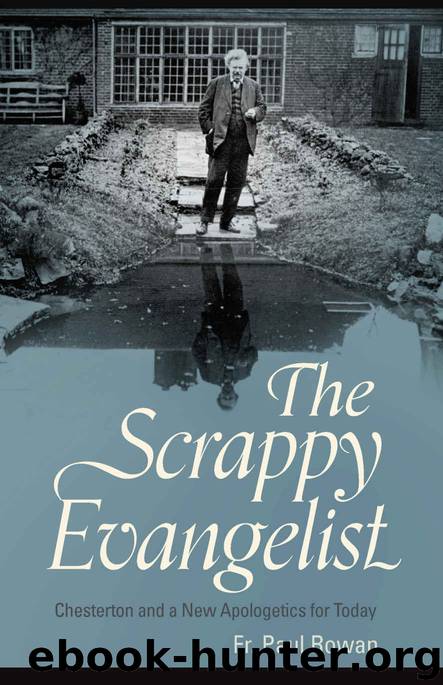The Scrappy Evangelist: Chesterton and a New Apologetics for Today by Paul Rowan

Author:Paul Rowan [Rowan, Paul]
Language: eng
Format: azw3
Publisher: ACS Books
Published: 2017-11-10T05:00:00+00:00
Chesterton was grateful for the space of mutual presence which he and Frances offered each other—a presence which exacted a price but also brought deep joy. Human happiness depends on people learning to offer each other a space of mutual presence. Chesterton and Frances learned to be there for one another down the years, loving and trusting one another in such a way that they faced the mix of life together, enjoying the adventure of joy which they co-authored through all the vicissitudes that their life brought: learning to adjust to one another in the early years together; the tragedy of being unable to have children; the deaths of siblings; the near fatal illness of Chesterton from the winter of 1914 to the spring of 1915; Chesterton’s conversion to Catholicism in 1922.
All of this shared space and mutual presence freed taught them how to love. If, as we have already seen, George Bernard Shaw believed that the kinship of ideas and deep camaraderie which existed between Chesterton and Belloc justified coining the concept of the Chesterbelloc, perhaps it is left to Nancy Carpentier Brown and future researchers to show that it would be equally appropriate to write of the Chesterblogg.
As Chesterton and Frances show, the longer human beings stay together in relationship, trying to build community, the more aware they become of the tough demands of love. It is not easy to live out a life of love in community. When human beings learn, through the vicissitudes of day-to-day living, to be present to each other, they realize that fidelity and mutual respect are required to build community. Real love, true community, means being faithful to one’s word, never walking away from the relationship for good (even if one occasionally needs space to breathe) and recognizing the dignity of the other person enough to allow him or her to be free and to grow in the direction that their freedom dictates. Love is about remaining faithful to that decision, that act of the will, whether or not that decision is supported by feelings of warmth. In this sense, then, one can talk of community as affording us the opportunities for self-transcendence in real commitment to one another.
As we shall see in our final chapter, one of the dangers of a rationalistic and impoverished apologetics is that it can encourage people to believe in an unrelated and therefore sub-Christian deity. Dorothee Soelle, however, advocates a more concrete approach, rooted in the praxis of relationship and costly loving, to the communication of the reality of God. The constant challenge to transcend the self, which is demanded by living in relationship, can become a costly way of living that opens up a road to faith. Rather than asking, “Does God exist?” Soelle suggests that a more urgent question should be, “Does God occur also among us?” This more feminine notion of the immanence of God complements the more masculine notion of the transcendence of God, and allows us to state that God “occurs”
Download
This site does not store any files on its server. We only index and link to content provided by other sites. Please contact the content providers to delete copyright contents if any and email us, we'll remove relevant links or contents immediately.
Resisting Happiness by Matthew Kelly(3332)
The Social Psychology of Inequality by Unknown(3013)
Day by Elie Wiesel(2777)
Designing Your Life by Bill Burnett(2728)
The Giving Tree by Shel Silverstein(2330)
Human Design by Chetan Parkyn(2066)
The Supreme Gift by Paulo Coelho(1955)
Angels of God: The Bible, the Church and the Heavenly Hosts by Mike Aquilina(1950)
Jesus of Nazareth by Joseph Ratzinger(1801)
Hostage to the Devil by Malachi Martin(1798)
Augustine: Conversions to Confessions by Robin Lane Fox(1764)
7 Secrets of Divine Mercy by Vinny Flynn(1727)
Dark Mysteries of the Vatican by H. Paul Jeffers(1703)
The Vatican Pimpernel by Brian Fleming(1696)
St. Thomas Aquinas by G. K. Chesterton(1627)
Saints & Angels by Doreen Virtue(1599)
The Ratline by Philippe Sands(1564)
My Daily Catholic Bible, NABRE by Thigpen Edited by Dr. Paul(1482)
Called to Life by Jacques Philippe(1473)
